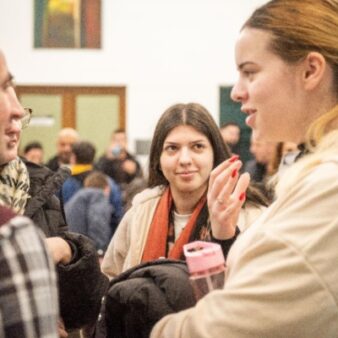World Habitat traces its roots back to 1946 – just a year after the end of the Second World War. A small group of homeless ex-servicemen with just thirty-nine pounds and 10 shillings set up the East Midlands Housing Association in Coalville, Leicestershire UK. Led by Peter Elderfield, it built houses for people in housing need. Over the years it developed into a large and highly successful organisation that continues to operate to this day, providing subsidised social housing and building affordable homes for sale.
In 1974 the UK government introduced state funding for Housing Associations so that they could build more social housing. East Midlands Housing Association took this opportunity, leading to a reorganisation. It needed to separate some functions into a different organisation. So, in 1976 Building and Social Housing Foundation (BSHF- later to become World Habitat) was established as a separate organisation with a remit to carry our housing research and encourage innovation. It became a registered charity and Peter Elderfield, became its first Director. He remained in this role until his death in January 2001. His then wife Pat Elderfield was instrumental in managing the separation of the organisations and the development of BSHF. Pat Elderfield involvement in World Habitat spanned 45 years, as honorary treasurer and later for a term of chair. She became Life President in 2022.
In 1985 World Habitat (then called BSHF) pioneered the search for innovative and successful housing practice around the world by establishing the World Habitat Awards, an international competition to identify, celebrate and share those housing solutions that make a difference to the lives of poor people and the communities they live in. Over many years The awards have helped promote some of the some of the most important ideas and innovations in housing. Its work led to the first Community Land Trusts being developed in Europe and helped the development of the Housing First model for ending homelessness to become established in Europe.
World Habitat has developed a global network of innovative organisations who share our goal of better housing, including UN-Habitat. In 1988, World Habitat (then called BSHF) was one of the founder members of Housing Europe and has held Special Consultative Status with the UN Economic and Social Council since 2006 for our work supporting the goals of UN-Habitat.
In 2015 World Habitat established the European End Street Homelessness campaign. In the early twenty first century street homelessness had appeared to be largely solved in many European countries, but the aftereffects of the 2008 financial crash caused it to roar back. It increased dramatically in every country in Europe apart from Finland. Inspired by World Habitat Award winners in the United States and Finland, the campaign demonstrated that it is possible to end street homelessness. It promotes policy change and practice to help cities across Europe on a pathway towards ending homelessness.
In 2018 World Habitat’s long-term aim of promoting community led approaches to housing led to the establishment of our Community Led Housing programme. The programme identified emerging new community led housing movements in countries where there was little previous experience. It has helped develop new community led housing movements in Brazil, Bangladesh and Central and Eastern Europe.
Our world is being reshaped by globalisation, technology, human induced climate-change, polarising wealth and a growing population exploiting limited resources. These changes are having a profound impact on where and how people live. All too often the worst effects are felt by the most vulnerable people and those on the lowest incomes. World Habitat adapts and responds to these new challenges to make housing safe and secure for people on low incomes in the pioneering spirit and practical nature of our founder, Peter Elderfield, and the establishing principals of Pat Elderfield.




